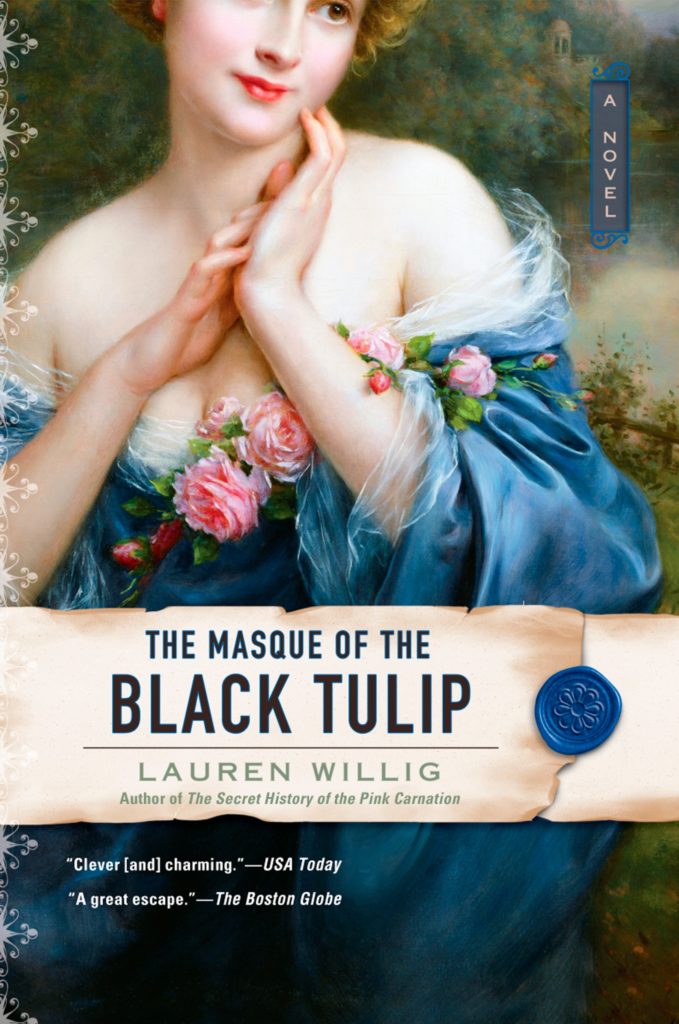The Masque of the Black Tulip
 Buy the Book:
Buy the Book: Amazon
Barnes & Noble
Indiebound
Books-A-Million
Amazon Audio
Barnes & Noble Audio
IndieBound Audio
Title: The Masque of the Black Tulip
Series: Pink Carnation Series #2
Published by: Berkley
Release Date: December 29, 2005
Pages: 464
ISBN13: 978-0451220042
Synopsis
The Pink Carnation, history's most elusive spy and England's only hope for preventing a Napoleonic invasion, returns in Lauren Willig's dazzling imaginative new historical romance.
The Masque of the Black Tulip opens with the murder of a courier from the London War Office, his confidential dispatch for the Pink Carnation stolen. Meanwhile, the Black Tulip, France's deadliest spy, is in England with instructions to track down and kill the Pink Carnation. Only Henrietta Selwick and Miles Dorrington know where the Pink Carnation is stationed. Using a secret code book, Henrietta has deciphered a message detailing the threat of the Black Tulip. Meanwhile, the War Office has enlisted Miles to track down the notorious French spy before he (or she) can finish the deadly mission. But what Henrietta and Miles don't know is that while they are trying to find the Black Tulip (and possibly falling in love), the Black Tulip is watching them.
Praise
• Quill Award Nominee 2006“With such appealing characters and plots, one fears that Willig, currently a Harvard Law student and History Ph.D. candidate, will never get those degrees."
-Kirkus Reviews"…many more will delight in this easy-to-read romp and line up for the next installment."
-Publishers Weekly"Charming…Willig’s new work is again terribly clever and funny…"
-Library Journal
Excerpt
“A footman was found murdered this morning in Mayfair.”
Miles rested one booted leg against the opposite knee, trying not to look disappointed. He had been hoping for something more along the lines of, “Bonaparte is poised to invade England, and we need you to stop him!” Ah, well, a man could dream.
“Surely, that’s a matter for the Bow Street Runners?”
Wickham fished a worn scrap of paper from the debris on his desk. “Do you recognize this?”
Miles peered down at the tiny fragment. On closer inspection, it wasn’t even anything so grand as a fragment; it was more of a fleck, a tiny triangle of paper with a jagged end on one side, where it had been torn from something larger.
“No,” he said.
“Look again,” said Wickham. “We found it snagged on a pin on the inside of the murdered man’s coat.”
It was no wonder the murderer had overlooked the lost portion; it was scarcely a centimeter long, and no writing remained. At least, no writing that was discernable as such. Along the tear, a thick black stroke swept down and then off to the side. It might be the lower half of an uppercase script “I”, or a particularly elaborate “T.”
Miles was just about to admit ignorance for a second time—in the hopes that Wickham wouldn’t ask him a third—when recognition struck. Not the lower half of an “I”, but the stem of a flower. A very particular, stylized flower. A flower Miles hadn’t seen in a very long time, and had hoped never to see again.
“The Black Tulip.” The name tasted like hemlock on Miles’ tongue. He repeated it, testing it for weight after years of disuse. “It can’t be the Black Tulip. I don’t believe it. It’s been too long.”
“The Black Tulip,” countered Wickham, “is always most deadly after a silence.”
Miles couldn’t argue with that. The English in France had been most on edge, not when the Black Tulip acted, but when he didn’t. Like the grey calm before thunder, the Black Tulip’s silence generally presaged some new and awful ill. Austrian operatives had been found dead, minor members of the royal family captured, English spies eliminated, all without fuss or fanfare. For the past two years, the Black Tulip had maintained a hermetic silence.
Miles grimaced.
“Precisely,” said Wickham. He extricated the scrap of paper from Miles’ grasp, returning it to its place of his desk. “The murdered man was one of our operatives. We had inserted him into the household of a gentleman known for his itinerant tendencies.”
Miles rocked forward in his chair. “Who found him?”
Wickham dismissed the question with a shake of his head. “A scullery maid from the kitchen of a neighboring house; she had no part in it.”
“Had she witnessed anything out of the ordinary?”
“Aside from a dead body?” Wickham smiled grimly. “No. Think of it, Dorrington. Ten houses—at one of which, by the way, a card party was in progress—several dozen servants coming and going, and not one of them heard anything out of the ordinary. What does that suggest to you?”
Miles thought hard. “There can’t have been a struggle, or someone in one of the neighboring houses would have noticed. He can’t have called out, or someone would have heard. I’d say our man knew his killer.” A hideous possibility occurred to Miles. “Could our chap have been a double agent? If the French thought he had outlived his usefulness…”
The bags under Wickham’s eyes seemed to grow deeper. “That,” he said wearily, “is always a possibility. Anyone can turn traitor given the right circumstances—or the right price. Either way, we find ourselves with our old enemy in the heart of London. We need to know more. Which is where you come in, Dorrington.”
“At your disposal.”
Ah, the time had come. Now Wickham would ask him to find the footman’s murderer, and he could make suave assurances about delivering the Black Tulip’s head on a platter, and...
Also in this series:










